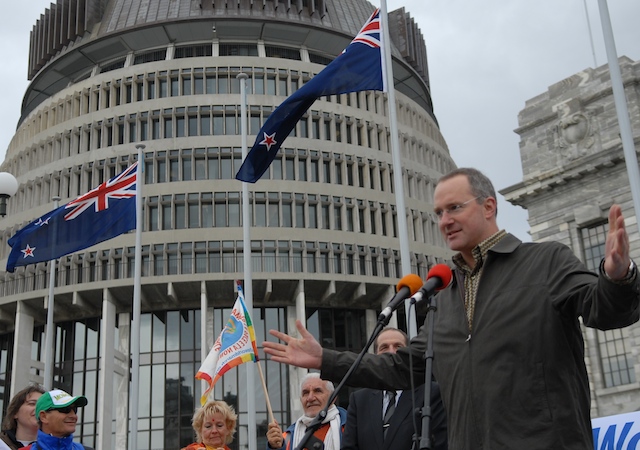Created under Prime Minister David Lange, New Zealand’s Nuclear Free Zone, Disarmament, and Arms Control Act of June 1987 formally established New Zealand territory and coastal waters as a nuclear-free zone, and prohibits visits by nuclear-powered and armed vessels and aircraft. The Act designates the Minister for Disarmament and Arms Control to work towards this goal and for peace and disarmament more generally.

Minister for Disarmament and Arms Control, Hon. Phil Twyford
Since the end of 2020, Hon. Phil Twyford has served as New Zealand’s Minister for Disarmament and Arms Control. According to the Minister, the dedicated portfolio demonstrates domestically as well as to friends and partners offshore how New Zealand is serious when it comes pursuing disarmament and arms control goals. In June 2021, the Minister released New Zealand’s Disarmament Strategy 2020-2021., which sets key objectives across three major workstreams: nuclear disarmament and non-proliferation; strengthening international humanitarian law; and shaping the future.
History of the Portfolio
Successive Ministers for Disarmament and Arms Control have helped establish New Zealand’s position as a respected leader in this field. Under their leadership, New Zealand was at the forefront of the successful diplomatic processes to create the 2008 Convention on Cluster Munitions and 1997 Mine Ban Treaty. It played central roles in creating the 1993 Chemical Weapons Convention and 2013 Arms Trade Treaty.
New Zealand disarmament ministers have led the country’s delegations to historic treaty meetings. They have spoken out against nuclear weapons testing and advocated entry into force of the 1996 Comprehensive Test Ban Treaty. The distinct ministerial portfolio has facilitated high-level engagement, bolstered diplomatic outreach, build cross-party support, and seen productive and collaborative relations with civil society. The post has been a demonstrable indicator of New Zealand’s status as an influential and a reliable partner in international security. New Zealand’s disarmament record was an important consideration in its successful bids for a non-permanent UN Security Council seat in 1993-1994 and 2015-2016.
The Ministers for Disarmament and Arms Control chairs the Public Advisory Committee on Disarmament and Arms Control (PACDAC), a committee of approximately eight experts that makes recommendations to fund projects and scholarships promoting public education and support for disarmament and arms control. The funds are disbursed through the Peace and Disarmament Education Trust and the
Previous Ministers for Disarmament and Arms Control of Aotearoa New Zealand
Ten New Zealand politicians have held the position of Minister for Disarmament and Arms Control since the portfolio was created 35 years ago:
Russell Marshall (1987-1989)
Hon. Fran Wilde (1989-1990)
Hon. Douglas Graham (1990-1996)
Rt. Hon. Don McKinnon (1996-1999)
Rt. Hon. Matt Robson (1999-2002)
Hon. Marion Hobbs (2002-2005)
Hon. Phil Goff (2005-2008)
Hon. Georgina te Heuheu (2009-2011)
Rt. Hon. Winston Peters (2018-2020)
Hon. Phil Twyford (2020-present)
